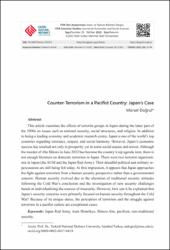Counter-Terrorism in a Pacifist Country: Japan’s Case
Citation
DOĞRUL, Mürsel. "Counter-Terrorism in a Pacifist Country: Japan’s Case." FSM İlmî Araştırmalar İnsan ve Toplum Bilimleri Dergisi, 20 (2022): 25-44.Abstract
This article examines the effects of terrorist groups in Japan during the latter part of
the 1990s on issues such as national security, social structures, and religion. In addition
to being a leading economy and academic research centre, Japan is one of the world’s top
countries regarding tolerance, respect, and social harmony. However, Japan’s economic
success has resulted not only in prosperity yet in some social unease and unrest. Although
the murder of Abe Shinzo in June 2022 has become the country’s top agenda item, there is
not enough literature on domestic terrorism in Japan. There were two terrorist organizations
in Japan (the AUM and the Japan Red Army). Their dreadful political and military repercussions
are still being felt today. At first impression, it appears that Japan approaches
the fight against terrorism from a human security perspective rather than a governmental
concern. Human security evolved due to the alteration of traditional security attitudes
following the Cold War’s conclusion and the investigation of new security challenges
based on individualizing the sources of insecurity. However, how can it be explained that
Japan’s security concerns were primarily focused on human security throughout the Cold
War? Because of its unique status, the perception of terrorism and the struggle against
terrorism in a pacifist culture are exceptional cases.



















